Major themes
The author was trying to provoke the question to the reader, "What does it mean to be human?". There are definitely religious ideas here, and it is important to note that Loriga was raised Catholic. Memory is linked to sin, both original and individual. Almost reminiscent of Dr. Heidegger's Experiment by Nathaniel Hawthorne, each character is to some extent doomed to make the same mistakes they did before. Therefore, one could draw the conclusion that our sins are a part of us, inseparable and thus uncontrollable.
The novel can be described as very European because it reflects the pain of the Second World War and its extension into the future. The author once said in an interview that, "...we Europeans are so divided amongst ourselves, but we have so much in common -- a common history and a heavy past that we carry, and at some point you feel we look back more than we look forwards. Whereas in America it's the other way around. It doesn't mean whatever they're saying or whatever they're seeing is better than what we're doing. It's not a good thing in itself. But it's true: Americans are more like little kids in a way, they predict themselves in the future. We're the old people now." [2]
This is clearly shown towards the end of the book when the inventor, K.L. Krumper, talks about being injured and in a hospital, watching reconstruction work and thinking. "Now seeing absolutely clearly the feeling of peace sweeping through those labourers as they finished their job, I decided to place all my faith in the demolition of the past...You have to remember that in those days I was just one more of the millions of soldiers surviving from a vanquished army. Belonging to a dead Germany, defeated by shame...We came back to Germany in the slow trains defeated, like strangers ejected from paradise by strangers. The destruction of the past then seemed to me to be the only possible hope."
At the same time then, the book jumps to the opposite position and reflects a Nietzschean concept found throughout the writings of modern authors like Chuck Palahniuk. The idea being that you have to break societies (or people) down before they can become something better.
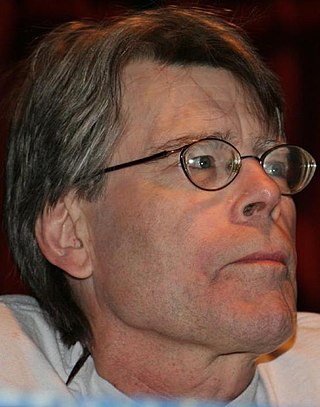
Stephen Edwin King is an American author of horror, supernatural fiction, suspense, crime, science-fiction, and fantasy novels. Called the "King of Horror", his books have sold more than 350 million copies as of 2006, and many have been adapted into films, television series, miniseries, and comic books. He has also written approximately 200 short stories, most of which have been published in book collections. His debut, Carrie, was published in 1974, and was followed by 'Salem's Lot, The Shining, The Stand and The Dead Zone. Different Seasons, a collection of four novellas, was his first major departure from the horror genre. The novellas provided the basis for the films Stand by Me and The Shawshank Redemption. King has published under the pseudonym Richard Bachman and has cowritten works with other authors, notably his friend Peter Straub and sons Joe Hill and Owen King.

The Giver is a 1993 American young adult dystopian novel written by Lois Lowry, set in a society which at first appears to be utopian but is revealed to be dystopian as the story progresses. In the novel, the society has taken away pain and strife by converting to "Sameness", a plan that has also eradicated emotional depth from their lives. In an effort to preserve order, the society also lacks any color, climate, terrain, and a true sense of equality. The protagonist of the story, a 12-year-old boy named Jonas, is selected to inherit the position of Receiver of Memory, the person who stores all the memories of the time before Sameness. Jonas struggles with concepts of the new emotions and things introduced to him, and whether they are inherently good, evil, or in between, and whether it is possible to have one without the other.
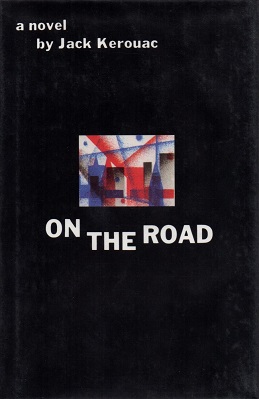
On the Road is a 1957 novel by American writer Jack Kerouac, based on the travels of Kerouac and his friends across the United States. It is considered a defining work of the postwar Beat and Counterculture generations, with its protagonists living life against a backdrop of jazz, poetry, and drug use. The novel is a roman à clef, with many key figures of the Beat movement, such as William S. Burroughs, Allen Ginsberg, and Neal Cassady represented by characters in the book, including Kerouac, himself, as the narrator, Sal Paradise.

"Sympathy for the Devil" is a song by English rock band the Rolling Stones. The song was written by Mick Jagger and credited to the Jagger–Richards partnership. It is the opening track on the band's 1968 album Beggars Banquet. The song has received critical acclaim and features on Rolling Stone's 500 Greatest Songs of All Time list.
The Star Trek canon is the set of all material taking place within the Star Trek universe that is considered official. The definition and scope of the Star Trek canon has changed over time. Until late 2006, it was mainly composed of the live-action television series and films before becoming a more vague and abstract concept. From 2010 until 2023, the official Star Trek website's site map described their database, which listed both animated and live-action series and films as its sources, as "The Official Star Trek Canon."
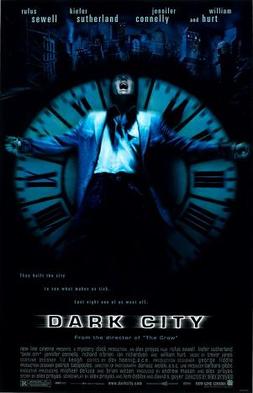
Dark City is a 1998 neo-noir science fiction film directed by Alex Proyas and starring Rufus Sewell, William Hurt, Kiefer Sutherland, Jennifer Connelly, Richard O'Brien, and Ian Richardson. The screenplay was written by Proyas, Lem Dobbs, and David S. Goyer. In the film, Sewell plays an amnesiac man who, finding himself suspected of murder, attempts to discover his true identity and clear his name while on the run from the police and a mysterious group known as the "Strangers".

The Perks of Being a Wallflower is a 1999 young adult novel by American author Stephen Chbosky. Set in the early 1990s, the novel follows Charlie, an introverted and observant teenager, through his freshman year of high school in a Pittsburgh suburb. The novel details Charlie's unconventional style of thinking as he navigates between the worlds of adolescence and adulthood, and attempts to deal with poignant questions spurred by his interactions with both his friends and family.

Jorge Loriga Torrenova, better known as Ray Loriga, is a Spanish author, screenwriter, and director.
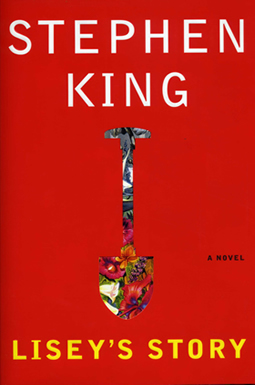
Lisey's Story is a novel by American writer Stephen King that combines elements of psychological horror and romance. The novel was released on October 24, 2006. It won the 2006 Bram Stoker Award for Best Novel, and was nominated for the World Fantasy Award in 2007. An early excerpt from the novel, a short story titled "Lisey and the Madman", was published in McSweeney’s Enchanted Chamber of Astonishing Stories (2004), and was nominated for the 2004 Bram Stoker Award for Best Long Fiction. King has stated that this is his favorite of the novels he has written.

No Country for Old Men is a 2007 American neo-Western crime thriller film written and directed by Joel and Ethan Coen, based on Cormac McCarthy's 2005 novel of the same name. Starring Tommy Lee Jones, Javier Bardem, and Josh Brolin, the film is set in the desert landscape of 1980 West Texas. The film revisits the themes of fate, conscience, and circumstance that the Coen brothers had explored in the films Blood Simple (1984), Raising Arizona (1987), and Fargo (1996). The film follows three main characters: Llewelyn Moss (Brolin), a Vietnam War veteran and welder who stumbles upon a large sum of money in the desert; Anton Chigurh (Bardem), a hitman who is sent to recover the money; and Ed Tom Bell (Jones), a sheriff investigating the crime. The film also stars Kelly Macdonald as Moss's wife, Carla Jean, and Woody Harrelson as Carson Wells, a bounty hunter seeking Moss and the return of the $2 million.

Fear and Loathing in Las Vegas: A Savage Journey to the Heart of the American Dream is a 1971 novel in the gonzo journalism style by Hunter S. Thompson. The book is a roman à clef, rooted in autobiographical incidents. The story follows its protagonist, Raoul Duke, and his attorney, Doctor Gonzo, as they descend on Las Vegas to chase the American Dream through a drug-induced haze, all the while ruminating on the failure of the 1960s countercultural movement. The work is Thompson's most famous book and is noted for its lurid descriptions of illicit drug use and its early retrospective on the culture of the 1960s. Thompson's highly subjective blend of fact and fiction, which it popularized, became known as gonzo journalism. Illustrated by Ralph Steadman, the novel first appeared as a two-part series in Rolling Stone magazine in 1971 before being published in book form in 1972. It was later adapted into a film of the same title in 1998 by director Terry Gilliam, starring Johnny Depp and Benicio del Toro, who portrayed Raoul Duke and Dr. Gonzo, respectively.

Marijane Agnes Meaker was an American writer who, along with Tereska Torres, was credited with launching the lesbian pulp fiction genre, the only accessible novels on that theme in the 1950s.
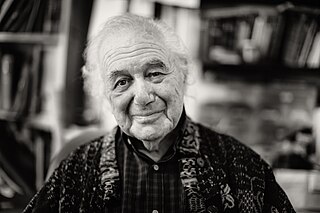
Jacob Needleman was an American philosopher, author, and religious scholar.
John Joseph Cardiel is a former professional skateboarder and snowboarder who has been a core member of the AntiHero Skateboards company since it was founded in 1995.
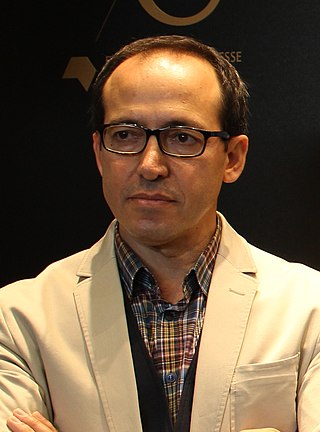
Burhan Sönmez is a Kurdish human rights lawyer and novelist from Turkey. He is the President of PEN International, elected at the Centennial Congress in 2021. He is also Senior Member and a By-Fellow of Hughes Hall College, University of Cambridge.

Flight: A Quantum Fiction Novel is a novel by American writer Vanna Bonta.

"Forever Evil: Blight" is a 2013–2014 crossover storyline published by DC Comics that began in October 2013, set within the larger "Forever Evil" storyline. The story, which is seen in the series Constantine, Justice League Dark, Trinity of Sin: Pandora, and Trinity of Sin: The Phantom Stranger, sees John Constantine, Swamp Thing, Nightmare Nurse, Pandora, and the Phantom Stranger attempt to defeat Blight, who is the manifestation of evil itself, and rescue the missing members of the Justice Leagues. The announcement of "Forever Evil: Blight" promised changes to the status quo for the titles involved at its conclusion, with each having major changes.

I Am Brian Wilson: A Memoir is the second autobiographical memoir of American musician Brian Wilson, written by journalist Ben Greenman through several months of interviews with Wilson. It was intended to supplant Wouldn't It Be Nice: My Own Story, Wilson's disowned autobiography from 1991. I Am Brian Wilson was published by Da Capo Press on October 11, 2016, one month after the release of Mike Love's autobiography: Good Vibrations: My Life as a Beach Boy.
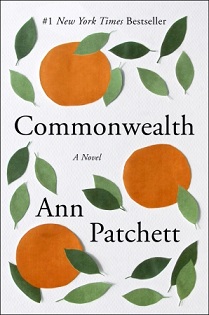
Commonwealth is the seventh novel by American author Ann Patchett, published in 2016. The novel begins with an illicit kiss that leads to an affair that destroys two marriages and creates a reluctantly blended family. In a series of vignettes spanning fifty years, it tells the story of the six children whose lives were disrupted and how they intertwined.

Levels of Life is a 2013 memoir by English author Julian Barnes, dedicated to his wife Pat Kavanagh, a literary agent who died in 2008.
















